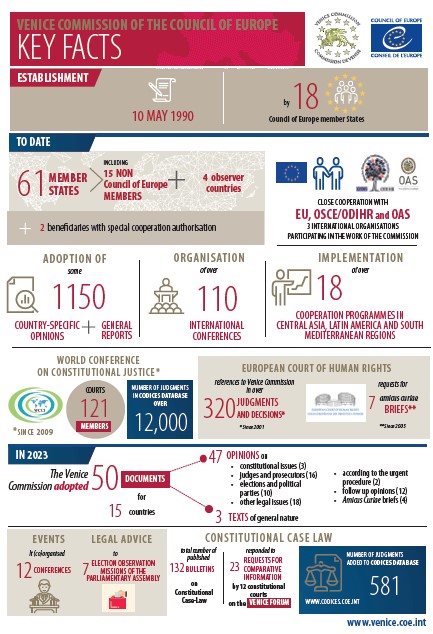The Commission’s activities
The action of the European Commission for Democracy through Law is based on the three ground principles of the European constitutional heritage: democracy, human rights and the rule of law, which at the same time form the basis of activities of the Council of Europe. These principles have their expression in three key areas of action of the Commission:
• democratic institutions and fundamental rights;
• constitutional justice and ordinary justice;
• elections, referendums and political parties.
The Commission also shares the standards and best practices adopted within the countries of the Council of Europe beyond its borders notably in neighboring countries. Within the above-mentioned areas of action the Commission uses the following types of activities:
Opinions and studies
The Venice Commission’s primary task is to provide states with legal advice in the form of “legal opinions” on draft legislation or legislation already in force which is submitted to it for examination. It also produces studies and reports on topical issues. Groups of members assisted by the secretariat prepare the draft opinions and studies, which are then discussed and adopted at the Committee’s plenary sessions.
|
Who can request an opinion
|
|
Member states
• parliaments
• governments
• heads of state
|
Council of Europe
• Secretary General
• Committee of Ministers
• Parliamentary Assembly
• Congress of Local and
Regional Authorities
|
International organisations
• European Union
• OSCE/ODIHR
• OAS
• other international organisations involved in the Commission’s work
|
Amicus curiae opinions
At the request of a constitutional court or the European Court of Human Rights, the Commission may also provide amicus curiae opinions, not on the constitutionality of the act concerned, but on comparative constitutional and international law issues. The Commission also co-operates with ombudspersons through amicus ombud opinions mainly concerning the legislation that governs their work.
How an opinion is prepared?
Reference to the Commission of a (draft) constitutional or legislative text by a national or international body or the Council of Europe [1]
↓
Setting up of a working group of rapporteur
members and experts assisted by the secretariat
↓
Draft opinion on compliance of the text with international standards
and proposed improvements
↓
Visit to the country
for talks with the authorities, civil society and other interested stakeholders
↓
Final draft opinion
↓
Submission of the final draft opinion
to all members of the Commission before the plenary session
↓
Discussion of the draft opinion in a sub-commission and with the national authorities
(if necessary)
↓
Discussion and adoption/endorsement(*) of the opinion at plenary session
↓
Submission of the opinion to the body which requested it
↓
Publishing of the final text of the opinion on the Commission’s website: www.venice.coe.int
_______________________________________________________________________________
[1] Request for opinion may be sent to the President or the Secretary of the Commission by email.
(*) The Commission “endorses” a draft opinion prepared by the rapporteurs when two conditions are fulfilled:
- it wishes to express its agreement with the draft opinion prepared by the rapporteurs (as in the case of adoption);
- but there are circumstances which make it appear unnecessary to go into detail, either because the text was already issued, adopted or already abandoned.
____________________________________________________________________________________________
Endorsed opinions - very often urgent opinions issued between the plenary sessions - are public documents just like adopted opinions.

A dialogue-based working method
The Commission does not seek to impose the solutions set out in its opinions. Rather, it adopts a non-directive approach based on dialogue and shares member states’ experience and practices. For this reason, a working group visits the country concerned to meet the various stakeholders and to assess the situation as objectively as possible. The authorities are also able to submit comments on the draft opinions to the Commission. The opinions prepared are generally heeded by the countries concerned.
International institutions, civil society and the media regularly refer to the Commission’s opinions.
Conferences and seminars
As the quality of democracy depends not only on the quality of laws, but also on their implementation, the Commission holds seminars and conferences in partnership with constitutional courts, parliaments, central electoral commissions and universities.
Co-operation with countries beyond Europe
Without losing sight of its objective in Europe, the Commission is increasingly called upon to act outside the region. Through activities in all its areas of responsibility in countries in the Maghreb, Central Asia and Latin America, the Venice Commission has confirmed its reputation as an independent, impartial, competent and reliable partner of the authorities in the countries concerned and the various international organisations active in those regions.
Useful links:
___________________________________________________________________________